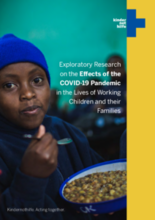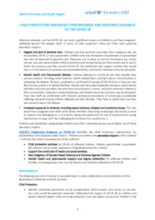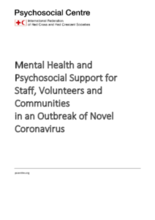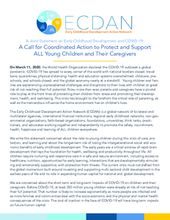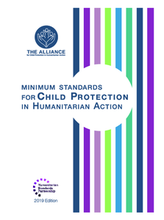This section includes resources on the response to the COVID-19 pandemic as it relates to child protection and children's care.
News on COVID-19 and Children's Care
Webinars and Events on COVID-19 Response
Displaying 711 - 720 of 756
This exploratory research led by Kindernothilfe between May – July 2020 shows how the challenges facing working children and their families have been exacerbated since the outbreak and it presents their recommendations for effective and relevant responses to the pandemic.
In the light of the COVID19 pandemic and with the aim to support a disability-inclusive response to the crisis, International Disability Alliance (IDA) has launched this webpage to share the most recent updates and resources as they become available.
This resource from Changing the Way We Care offers guidance on adapting and/or developing services and programming to continue to best serve children and families throughout the rapidly changing times of the COVID-19 pandemic, particularly on conducting virtual monitoring of children, families, alternative care placements and residential care facilities.
This guide from UNICEF East Asia and Pacific Region provides guidance on preparing for, and responding to child protection needs during the COVID-19 crisis.
This document is a repository of resources focusing on Covid-19, disability, mental health, chronic health conditions and related topics curated by the International Disability and Development Consortium Inclusive Health Task Group (IDDC IHTG) and the CORE Group Disability Inclusive Health Technical Advisory Group.
This briefing note provides background knowledge on the MHPSS aspects related to nCoV and suggests MHPSS activities that can be implemented.
The Early Childhood Development Action Network (ECDAN) partners have co-developed and launched a Call For Coordinated Action urging all governments, global partnerships, multi- and bi-lateral agencies, political bodies, funders, international non-governmental organizations, faith-based organizations, the business sector, academia, civil society organizations, networks, and advocates to prioritize and invest in the needs of ALL young children and their parents and caregivers, especially the most vulnerable, during the COVID-19 pandemic response and recovery.
This module outlines 3 hours (180 minutes) of training activities and materials related to psychosocial support (PSS) and social and emotional learning (SEL) in emergency contexts.
The Minimum Standards for Child Protection in Humanitarian Action (CPMS), originally launched in 2012, set out a common agreement on what needs to be achieved in order for child protection in humanitarian settings to be of adequate quality. Years of implementing the CPMS in diverse settings revealed the need for a more user-friendly version of the Standards that would reflect recent sector learning and evidence; improve guidance on prevention, gender and age inclusion, and other cross-cutting themes; and promote applicability to a broader range of humanitarian contexts. Therefore, the Standards were updated in 2019 through a two-year revision process.
This study guide is a companion to Guidance Note: Protection of Children during Infectious Disease Outbreaks, which provides humanitarian child protection practitioners with guidance on how to engage in responses to infectious disease outbreaks to ensure children’s protection needs are taken into account in preparedness for, and during responses to, the outbreaks.

